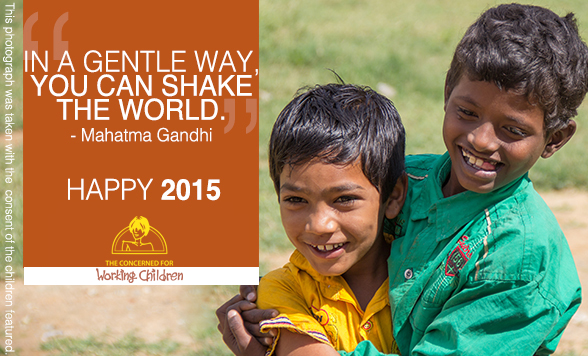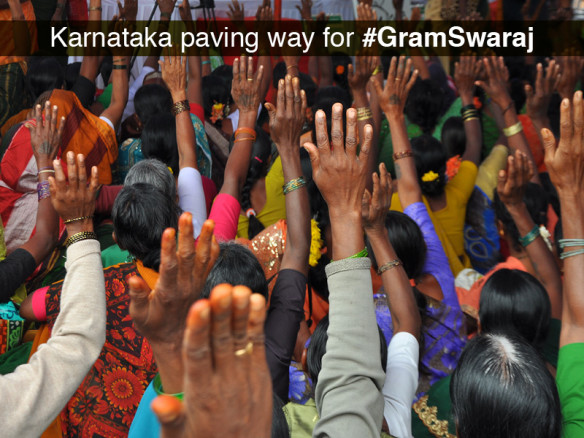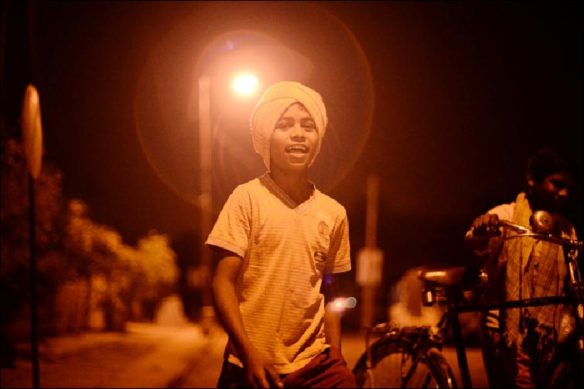CWC Newsletter – Issue 04 January 2015
In this issue:
- Towards a new year and approach to child rights
- Taking Destiny in their Hands: Children’s participation in the international policy arena
- Pivoted on participation: Child Protection Policy for Schools (Draft), Karnataka
- Have you signed the petition supporting the Gram Swaraj Bill?
- Suggested readings
- Recent stories you may have missed
Towards a new year and approach to child rights
On 8th December 2014, in the year of the 25th Anniversary of the UN Convention on the Rights of the Child, the global office of UNICEF declared that “The year 2014 has been one of horror, fear and despair for millions of children, as worsening conflicts across the world saw them exposed to extreme violence and its consequences, forcibly recruited and deliberately targeted by warring groups. Yet many crises no longer capture the world’s attention.” This was unfortunately reiterated by the terrible violence experienced by children in Peshawar later in the month.
Yet the November release of The State of the World’s Children Report 2015 was full of hope for the future. Entitled ‘Reimagining the future: Innovation for every child’, the report recognises and calls for a paradigm shift in the collective approach to children’s rights globally. It also recognises strongly the possibilities brought about by the advent of the information age even as it rightly highlights how new technology needs to be consciously engaged with and geared for dealing with issues of marginalised children. It celebrates ‘creativity, connectivity and collaboration’ and is rich with the voices of children and adults who have helped, and are continuing to help, develop innovative solutions to problems faced by different groups of children. It prominently pitches children as ‘agents of change’ and keeps their qualitative participation and thinking at the centre of this new methodology.
2015, will be an important year for The Concerned for Working Children too. It heralds for us our 35th year in the field of children’s rights. We began our journey with small but significant conversations with working children who felt invisible in a crowd of marginalised adults. Our initial small collaboration with children, over the years grew into an International Movement led by them. Simultaneously, children’s inputs helped us gauge how we could better orient our work to some of their needs. This led to the organic development of our programmes relating to education and decentralization. The idea that children are protagonists, that they are capable of changing the narrative of their lives, has been the key principle behind all this work. Hence, we welcome and celebrate this strong focus on the capacity of children as ‘agents of change’. In the past 35 years, we have experienced time and again the astounding ways in which children can overturn traditional power structures with innovative and new thinking yet do it in a manner that is non-violent and in fact invigorates adults and often moves them deeply.
We do believe though that while children are spectacular in their ability to think out of the box and be courageous even with minimal support, adults continue to play a significant role as duty bearers. According to where they are located in the institutional structures relating to children, they each play an important part in ensuring that the rights of a child are realized. From parents, community members and teachers who shape the child’s immediate space to governments at various tiers who shape the external political ecology, adults cannot shrug away the responsibility of doing their bit in ensuring an environment that is conducive for the growth and well-being of all children. Issues such as child labour and child marriage, deeply embedded within the fabric of society, will not be dealt a serious blow unless adults take on the mantle of facilitating the processes which allow children to innovate and re-imagine their future. We hope 2015 will be that year when we collectively begin to take cognizance of the wisdom of our children and ensure that we co-create a space which allows for its nurturance.
Taking Destiny in their Hands: Children’s participation in the international policy arena
Taking Destiny in their Hands is a film by Kavita Ratna, Director – Advocacy of The Concerned for Working Children. It is a film of hope and a call for clarity as it documents the relevance of the International Movement for Working Children and the central themes that it addresses. It gives viewers a rare opportunity to listen to children’s analyses of global problems, their strategies to overcome them and their call to adults and policy-makers to give them due credit as social actors. This film is currently a part of a global online Film Festival – Culture Unplugged. You can also watch the film here and tell us what you think in the comments section.
Pivoted on participation: Child Protection Policy for Schools (Draft), Karnataka
A spate of reported cases of sexual abuse of children in middle class school spaces in Bangalore brought to focus the serious issue of safety and protection within schools across Karnataka last year. In response to this, Karnataka will be the first state in the country to consider putting in place a state Child Protection Policy for Schools. The Department of Women and Child setup a Committee consisting of child rights experts (of which The Concerned for Working Children was a part) to suggest a draft policy. The Committee broadened the conversation on protection beyond child sexual abuse and brought in other protection related concerns. Through extensive work and consultations it has now been able to share a draft with the relevant departments. A copy of the draft was put up for comment by the Department of Public Instruction late November.
The Concerned for Working Children believes that qualitative participation and involvement of children in issues relating to them transforms how rights to protection and provision are understood, accessed and used by children. This principle is strongly embedded in the draft Child Protection Policy (CPP) in terms of all systems suggested within it. It was also observed by the Committee that there were several initiatives that had been taken over the years by various departments in order to address the issue of protection and the lack of complaints mechanisms. There was need to consolidate these initiatives into a system where the strengths of all departments were converged and functional child-centric mechanisms were evolved. Hence, the CPP has a strong focus on inter-agency networking, inter-departmental convergence and decentralisation in order to create governance and complaints mechanisms which prevent and respond with immediacy to all forms of abuse, maltreatment and harm of children.
During the exchanges which informed the drafting, it was recognised that government schools in many ways had more formalised systems of checks and balances regarding protection, these were completely missing in the case of private schools. This implies that a change in law needs to take place to extend the jurisdiction of the state where protection is concerned, to all schools in the geographical region of Karnataka. The CPP is to be applicable to all government schools, aided schools, private schools, junior colleges, vocational training institutions and international schools in Karnataka. Its key aim, as defined within it, is to: ensure all schools have a Child Protection Policy in place that is implemented for the safety of children; ensure schools have reporting mechanisms in place, and follow prescribed procedures; facilitate capacity building of key personnel for effective implementation of the policy; promote convergence of concerned departments and agencies in providing required services.
To implement the Policy, Part B sets out Comprehensive Guidelines and Procedures for protection of children in school, and Part C is the Child Safety Plan – a Checklist for ensuring Safety Standards in Schools, and used for self-assessment by schools and authorities. The Guidelines attached to the policy emphasise the concept of ‘safe schools’. ‘Safe schools’ are to have a child-centric approach that enables self-determination through qualitative participation, uses child friendly language and methodology and is a non-discriminatory space. The idea of a safe school is also important to regard from the perspective of recognising that research has often indicated that most cases of child sexual abuse take place in and around the child’s home. In this case, the school also becomes the potential safe space that allows a child to share their experiences and access support and help. This has meant a strong focus on prevention and capacity building within the CPP for the children and adults within schools and response systems.
The draft Child Protection Policy (CPP) is a big step taken towards a child-friendly and child-sensitive approach where all aspects of protection from prevention to response are provided for clearly. The draft is now under cabinet consideration and it is expected that the Guidelines will be developed further to cover other institutions like playschools, anganwadis, residential schools, hostels and other childcare institutions shortly. You can read the draft CPP and related documents here. Do share your thoughts and comments with us.
Have you signed the petition supporting the Gram Swaraj Bill?
Human Rights organisations across India, MLAs, MLCs and State Commissions of Karnataka rise to support the proposed Gram Swaraj Bill which has special provisions for upholding the rights of children, women and marginalised communities. Have you signed the petition?
We need your support to pave the way for Gram Swaraj! Sign the petition today!
Organisations supporting the Gram Swaraj Bill are: KiliKili, Akshara Foundation, Magic Bus, Action Aid India, World Vision India, Hunger Project India, Child Rights Trust – CRT, National Institute of Public Cooperation and Child Development, Insa India, The Association of People with Disability, Campaign Against Child Labour, Bosco, APSA India, Headstreams, Ashraya Foundation, Alternative Law Forum, Bharati Integrated Rural Development Society, Centre for Social Action – Christ University, Equations India, Centre for Child and Law, Centre for Education and Documentation, Karnataka State Commission for Protection of Child Rights Asha Deep Bangalore, Vimochana Womens Rights, CIVIC, Karnataka Kolachapradesha Nivas, Karnataka Street Vendors Association and Maraa.
State Commission for Women, State Commission for Religious Minorities and The State Commission for Protection of Child Rights have realised the relevance of the proposed Gram Swaraj Bill and have also extended their support and expressed solidarity.
State Commission for Women, State Commission for Religious Minorities and The State Commission for Protection of Child Rights have realised the relevance of the proposed Gram Swaraj Bill and have also extended their support and expressed solidarity.
Suggested readings
- Rise of the neo-slums
- State’s youngest get the least funding
- Special children to get free education until 18
Recent stories you may have missed
- Karnataka Panchayat Raj Act Amendment Committee Report, 2014: Making Grama Swaraj a reality
- Who ensures children’s right to protection?
- Third Asian Forum on the Rights of the Child held in August 2014 in Ulaanbaatar, Mongolia
- Celebrating Child Rights Week while commemorating the 25th Anniversary of United Nations Convention of the Rights of the Child






